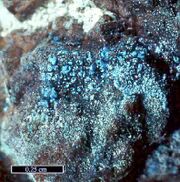Difference between revisions of "Calumetite"
Jump to navigation
Jump to search

| (4 intermediate revisions by the same user not shown) | |||
| Line 1: | Line 1: | ||
| + | [[File:Calumentite Webmineral.jpg|thumb|Calumetite; Jeff Weissman / Photographic Guide to Mineral Species at Web Mineral: [http://www.webmineral.com/data/Calumetite.shtml#.Y5C8xCjMJs- Link]]] | ||
== Description == | == Description == | ||
| − | A light blue copper corrosion product | + | A light blue copper corrosion product that rarely occurs as a mineral. As a mineral, it was discovered in 1963 at the Centennial Miner near Calumet, Michigan. Calumetite has been identified as a copper corrosion product on bronzes (Scott 2000). |
| + | |||
| + | ==Physical and Chemical Properties== | ||
| + | |||
| + | * Composition = Cu(OH, Cl)<sub>2</sub> - 2(H<sub>2</sub>O) | ||
| + | * Description = azure to light blue crystals (orthorhombic) | ||
| + | * Streak = bluish-white | ||
| + | * Luster = pearly | ||
| + | * Hardness = 2 | ||
==Resources and Citations== | ==Resources and Citations== | ||
| Line 11: | Line 20: | ||
* Wikipedia: [https://en.wikipedia.org/wiki/Calumetite Calumentite] | * Wikipedia: [https://en.wikipedia.org/wiki/Calumetite Calumentite] | ||
| + | * Mindat: [https://www.mindat.org/min-870.html Calumentite] | ||
[[Category:Materials database]] | [[Category:Materials database]] | ||
Latest revision as of 11:54, 7 December 2022

Calumetite; Jeff Weissman / Photographic Guide to Mineral Species at Web Mineral: Link
Description
A light blue copper corrosion product that rarely occurs as a mineral. As a mineral, it was discovered in 1963 at the Centennial Miner near Calumet, Michigan. Calumetite has been identified as a copper corrosion product on bronzes (Scott 2000).
Physical and Chemical Properties
- Composition = Cu(OH, Cl)2 - 2(H2O)
- Description = azure to light blue crystals (orthorhombic)
- Streak = bluish-white
- Luster = pearly
- Hardness = 2
Resources and Citations
- David Scott, 'A Review of Copper Chlorides and Related Salts in Bronze Corrosion and as Painting Pigments'. Studies in Conservation, 45, 39-54, (2000).
- WebMineral: Calumentite
- Wikipedia: Calumentite
- Mindat: Calumentite